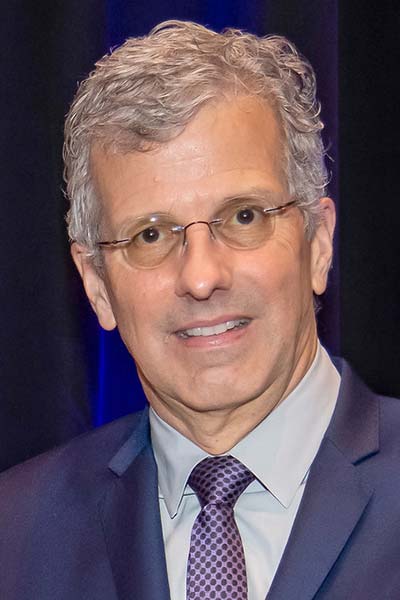J. Randall Curtis, MD, MPH, a past ATS president and director of the Cambia Palliative Care Center of Excellence at UW Medicine at the University of Washington, spoke about promoting compassion in clinical care, research, training, and mentoring to a standing room-only audience at the Plenary Session on Tuesday, May 17.

“Whatever the diagnosis, the goal is to improve the quality of life for both the patient and family and to provide an extra layer of support,” Dr. Curtis said. “Palliative care is appropriate at any age, at any stage in a serious illness, and can be provided together with curative treatment.”
Dr. Curtis, who has ALS, was unable to speak but stood at the podium as his text-to-speech presentation played. He began by defining palliative care as specialized care for people with serious illnesses with the intent of providing relief from the pain and stress of their illness.
It is rooted in compassion, he said, adding that in pulmonary medicine, the chronic lung diseases physicians work with are often incurable and cause great suffering that heightens the need for good palliative care.
Dr. Curtis noted that the quality of palliative care has increased overall in recent years, but there is still room for improvement, particularly since there is a large variability in the way palliative and end-of-life care is viewed in the ICU.
He cited a study of more than 27,000 patients who were ventilated more than four days in 152 ICUs. Even after adjustment for severity of illness and patient and ICU characteristics, there was tremendous variability from ICU to ICU with respect to the range of views on whether to withdraw life support — from 12 to 62 percent of deaths.
“This was not a uniquely American phenomenon,” said Dr. Curtis, as there was an “even greater degree of variability in the United Kingdom with variability in proportion of deaths preceded by withdrawing life support ranging from 5 percent to over 90 percent.”
These variabilities are found across countries, across ICUs in a single country, and even across physicians within a single ICU, he added.
The key features for success with palliative care is the delivery of compassion and care that is adapted to each setting, as well as to each patient and family member, Dr. Curtis said.
He recounted a landmark study that he was part of that identified patients who the attending physician thought would die in a few days and randomized them into groups of palliative intervention or usual care.
The intervention included a family conference using the VALUE mnemonic:
- V for valuing statements made by the family
- A for acknowledging family emotions
- L for listening to the family
- U for asking questions to better understand who the patient is as a person
- E for eliciting family questions throughout the family conference
They then measured self-reported levels of anxiety, depression, and post-traumatic stress in family members three months after the patient died. The result was that the relatively simple intervention resulted in dramatic reductions in those symptoms.
Subsequent studies on palliative care intervention have validated these findings and found that the palliative care intervention often improved key processes and outcomes, Dr. Curtis said.
Those studies also found that patient families and nurses assess a higher quality of dying and death when palliative care intervention is integrated into ICU care and that while survivors tend to stay the same length of time as those without palliative care, there was a significant reduction in the length of stay for patients who died.
Thus, palliative care may reduce the prolongation of pain and suffering often seen in the ICU, Dr. Curtis noted. Palliative care also resulted in decreased total ICU costs overall.
Dr. Curtis and his colleagues are now gearing up to study the impact of extended facilitators who work with families after the death of loved ones. The study will comprise two parallel trials in Seattle and Paris, France, and is funded by the National Institutes of Health, he said.
To sum up his findings, Dr. Curtis referred to an editorial that he and his colleague Mitchell Levy, MD, chief of the Division of Critical Care, Pulmonary, and Sleep Medicine at The Warren Alpert Medical School of Brown University, wrote recently for the ATS’s American Journal of Respiratory and Critical Care Medicine.
“First, we need to be kind to ourselves and to trust ourselves,” Dr. Curtis said. “It is hard to have compassion for others if we don’t have compassion for ourselves. Second, we need to be willing to make ourselves vulnerable to the pain and grief of others to provide empathy and compassion. We also need to be willing to be vulnerable in admitting we were wrong about something and model to others on our teams that it is OK to be wrong. Third, we need to be willing to be present and steady in the face of the grief or emotional pain that is so common in the ICU. For example, stepping into that room to comfort the family of the patient who has just died. Finally, we need to be able to live with the uncertainty that is inherent in life and especially common in the ICU, and we need to learn how to talk about that uncertainty with our colleagues, trainees and patients, and family members.”
Outgoing ATS President Lynn M. Schnapp kicked off the Plenary Session by presenting the Outstanding Educator Award, the Research Innovation & Translation Achievement Award, and the Outstanding Clinician Award. The meeting closed with ratification of the 2022-2023 slate of officers, including incoming President Greg Downey, MD, ATSF, pulmonologist and executive vice president of academic affairs in the Department of Medicine, National Jewish Health, who also spoke briefly.
REGISTER FOR ATS 2024
Register today for the ATS 2024 International Conference! Don’t miss this opportunity to take part in the in-person conference, May 17-22 in San Diego. Join your colleagues to learn about the latest developments in pulmonary, critical care, and sleep medicine.
Not an ATS member? Join today and save up to $540.
